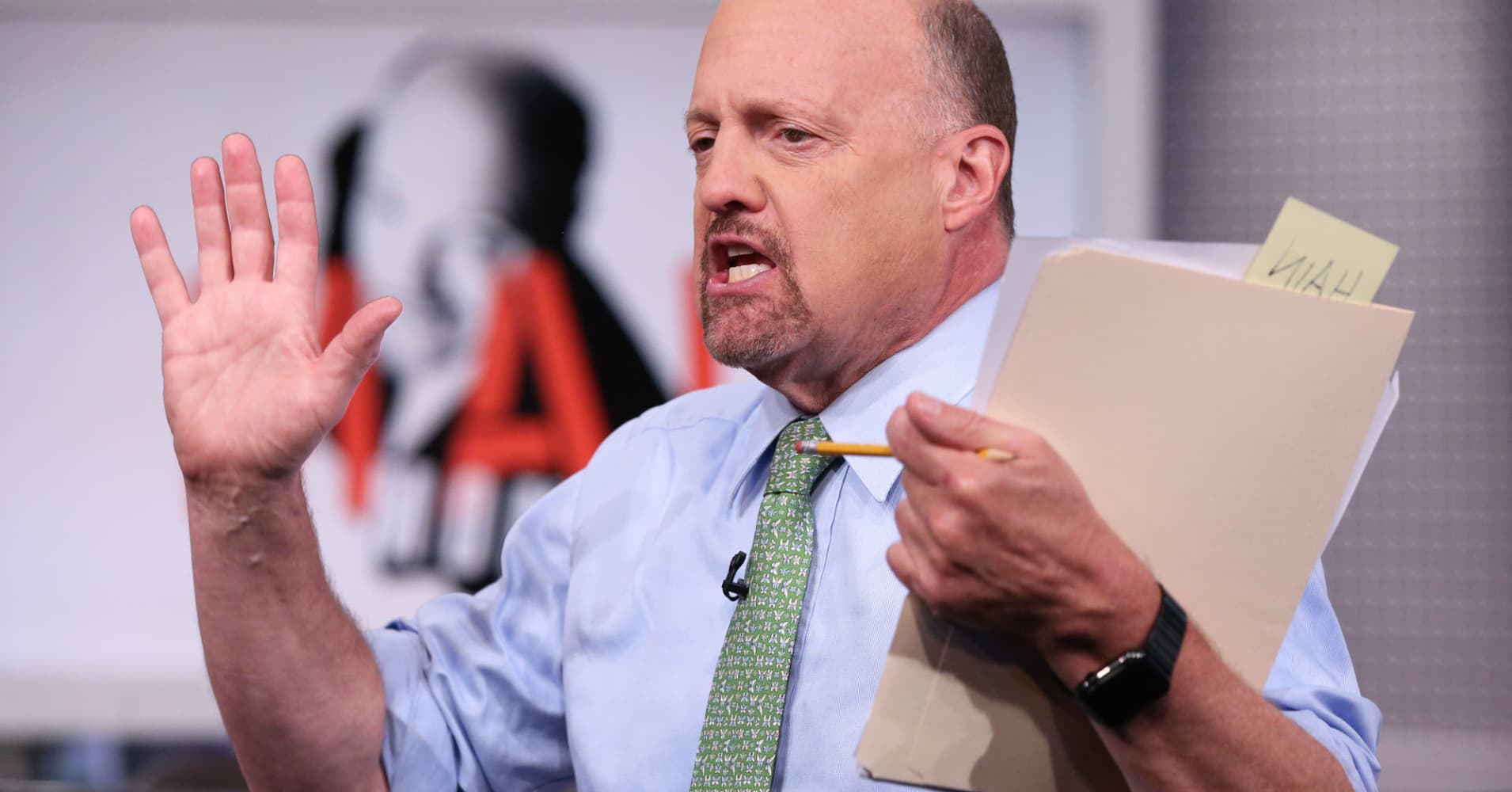Patient investors might want to consider buying shares of Micron Technology as things slowly turn positive for the chipmaker, CNBC’s Jim Cramer said Monday as Micron’s stock pulled the semicondcutor cohort higher.
Shares of Micron mounted a long-awaited recovery in Monday’s turbulent trading session after BMO Capital Markets analysts upgraded the stock to “buy” from “hold,” saying that its price had gotten too low to ignore.
Cramer, host of “Mad Money,” said investing in the cheap and steady Intel, the well-managed Broadcom, the recently downtrodden Advanced Micro Devices or the similarly pressured Texas Instruments were all good ways to play the turn in the chipmakers.
But Micron could also provide a solid payoff once its weakness is fully fleshed out, he said.
“Even Micron … could be worth owning, although I do think it’s got one more bad quarter before it can make the estimates,” Cramer said. “But if you wait until after that happens, you might be too late, which is why I agree with BMO that the stock is worth buying right here.”
Innovation has taken hold in the pharmaceutical space, and even Cramer’s impressed.
The last year has been pivotal for top drugmakers as some rebranded, others combined forces and still others prepared to reshape their portfolios with spin-offs and strategic acquisitions.
But innovation — both broadly and in areas that had been left untouched for years, like heart failure — has separated the strongest players from the rest of the pack, Cramer said, speaking after the first day of J.P. Morgan’s annual Healthcare Conference in San Francisco.
Not long ago, the longtime stock-picker would have directed investors to invest in technology stocks if they wanted to profit from innovation. But “tech’s hit a bit of a wall,” and things have improved dramatically for Big Pharma since industry leaders realized that putting money towards innovation could be their next leg higher, he said.
Click here for more of his analysis and recommendations.
Consumers and investors will “ultimately” come to value pharmaceutical companies that focus on curing diseases rather than treating them, Novartis CEO Vas Narasimhan said Monday.
Speaking at the 37th annual J.P. Morgan Healthcare Conference in San Francisco, Narasimhan told CNBC that Novartis may have to start separating itself from the idea that profitable medications — which are often lucrative because they manage chronic diseases rather than curing them — is one of the few ways to be successful in the pharmaceutical space.
“We’re getting into gene therapies and cell therapies that could cure patients of disease, and my belief is there are a lot of diseases we could tackle with these technologies and really provide cures,” Narasimhan, who took over as CEO in Feb. 2018, said in an interview with Cramer.
“What we’re really finding out is that society wants that and that, ultimately, they will value it,” he continued. “My conviction is that we’ll figure out the payment systems. We’ll figure out those challenges. But if you’re a company that could consistently bring cures to patients, you’re really well-positioned to be successful.”
Click here to watch and read more about Narasimhan’s interview.
A glut of patients who were prescribed Repatha, Amgen’s treatment for high cholesterol, but couldn’t pay for the pricey treatment, were top of mind in the company’s decision to cut the drug’s cost by 60 percent, Amgen Chairman and CEO Bob Bradway said Monday.
In October, Amgen cut the price for a biweekly dose of Repatha, bringing the annual $14,100 total, before discounts and rebates, to roughly $5,850. On Monday, the biotechnology giant announced another 60 percent price slash, this time to the cost of the monthly dose.
“We found too many patients were prescribed this therapy, but were struggling to pay for it at the pharmacy counter,” Bradway told Cramer. “The reaction so far from physicians and from patients has been very, very encouraging.”
Click here to watch and read more about his interview.
Novartis’ spin-off of Alcon may bring fresh competition to the eye-care space, but Bausch Health Companies is still its undisputed leader, CEO Joseph Papa argued in a Monday interview with Cramer.
“We think we have the most integrated eye-care company in the world, even including Alcon, because we have the surgical business, we have the prescription business, we have the over-the-counter consumer business and, clearly, we have the Rx business,” Papa said.
The CEO said the Alcon deal could even help the stock of Bausch, which changed its name from Valeant Pharmaceuticals to one closer to its leading franchise, Bausch + Lomb, last May.
The resulting company is “going to probably trade at a very high EBITDA multiple, which I actually think is going to be good for the Bausch stock because people will reevaluate the sum of the parts,” Papa said.
Click here to watch his full interview.
In Cramer’s lightning round, he shared his responses to callers’ stock questions:
Transocean Ltd.: “At this point, I want you to hold on. I think this group is dramatically oversold, but I will tell you: about 20 to 25 percent higher, you’re going to have to exit because it’s just not that kind of market. They need $100 oil to really kill it.”
Kraft Heinz Co.: “This stock has what I call no mojo. This stock is a goal-post hitter and then a bounce off and then a zero. It’s not going to go to $0, but I think that Kraft Heinz is a stock that, if it goes back to $50, I want you to sell, sell, sell. Can I be more clear? No.”
Disclosure: Cramer’s charitable trust owns shares of J.P. Morgan and Amgen.
Questions for Cramer?
Call Cramer: 1-800-743-CNBCWant to take a deep dive into Cramer’s world? Hit him up!
Mad Money Twitter – Jim Cramer Twitter – Facebook – InstagramQuestions, comments, suggestions for the “Mad Money” website? madcap@cnbc.com

